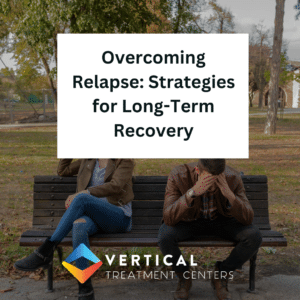
Overcoming Relapse: Strategies for Long-Term Recovery
Relapse is a common challenge in the journey of addiction recovery, but it doesn’t mean failure. It is an opportunity to learn, grow, and reinforce one’s commitment to long-term recovery. In this blog post, we will discuss strategies for overcoming relapse and maintaining long-term recovery, providing individuals with the tools they need to navigate potential setbacks and sustain positive change.
Understanding Relapse as Part of the Recovery Process
- Normalizing Relapse: Relapse is a common experience for many individuals in addiction recovery. Understanding that it is a normal part of the process can help individuals approach it with less self-judgment and shame.
- Identifying Triggers and Warning Signs: By recognizing the triggers and warning signs that may lead to relapse, individuals can develop strategies to manage or avoid them altogether. These triggers can vary from environmental cues to interpersonal stressors or emotional upheaval.
Strategies for Overcoming Relapse
- Seek Support: Reach out for support from a trusted and understanding network, such as a sponsor, therapist, or support group. Sharing one’s struggles and receiving guidance from others who have gone through similar experiences can be invaluable.
- Develop Coping Skills: Identify healthy coping mechanisms that can replace or supplement addictive behaviors. These can include mindfulness practices, exercise, hobbies, creative outlets, or engaging in therapeutic activities. Building a toolbox of healthy coping skills can provide alternatives during challenging times.
- Reevaluate and Adjust the Treatment Plan: Relapse can indicate that adjustments need to be made to an individual’s treatment plan. Collaborate with healthcare professionals to reassess the current approach and make necessary modifications, such as medication changes, therapy adjustments, or additional support services.
- Address Underlying Issues: Relapse often occurs when underlying issues, such as unresolved trauma, co-occurring mental health disorders, or dysfunctional relationships, are left unaddressed. Engage in therapy to explore and resolve these underlying issues, ultimately decreasing the risk of relapse.
- Adopt a Holistic Approach: Embrace a holistic approach to recovery that nurtures the mind, body, and spirit. This can involve practices like meditation, yoga, exercise, healthy nutrition, and spiritual exploration. Taking care of all aspects of one’s well-being can strengthen resilience and reduce the vulnerability to relapse.
Learn from Relapse and Maintain Motivation
- Self-Reflection and Understanding: Use the experience of relapse as an opportunity for self-reflection and greater self-understanding. Explore the factors that triggered the relapse and identify any patterns or thought processes that may have contributed to the setback.
- Set Realistic Goals: Set achievable and realistic goals that align with one’s recovery journey. Celebrate small milestones and acknowledge progress, no matter how small, to maintain motivation and optimism.
- Positive Support System: Surround oneself with positive and supportive individuals who uplift and encourage progress. Engaging in peer support groups or recovery communities can provide a network of understanding individuals who can offer guidance and accountability.
Celebrating Long-Term Recovery and Future Success
Overcoming relapse is a testament to an individual’s resilience and commitment to long-term recovery. By applying the strategies mentioned above and revisiting the steps to overcome relapse, individuals can continue to progress on their recovery journey towards a healthier and more fulfilling life.
Conclusion
Overcoming relapse is an essential part of the recovery process. By understanding relapse as a normal occurrence, implementing relapse prevention strategies, seeking necessary support, and maintaining a positive mindset, individuals can overcome setbacks and achieve long-term recovery. Remember, relapse is not failure but an opportunity to learn and grow stronger in one’s commitment to a healthier and addiction-free life.